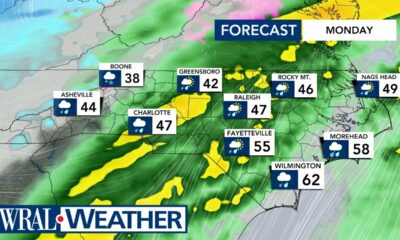Mississippi Today
‘A real twisted animal’ in Holly Springs: What’s next for the spiraling power provider

April Guest remembered seeing the outline of her breath appear inside her Ashland home. During the nights after the 2023 winter ice storm hit north Mississippi, the 68-year-old bunkered down under a table she repurposed into a hut, walling off the cold with her blankets.
“Just to get up to go to the bathroom felt like an Arctic quest,” Guest recalled. “It felt like just doing that could take my life.”
During the days, she stayed with her neighbor, whose oil lamp kept them warm in the single-digit chills. Then she returned to take refuge under the table in the house where she lives alone. It took five days, she said, for the power to finally come back on, although for some the outages lasted about twice as long.
The ice storm was a rare event for a state that often has mild winters. But the reality for Guest and about 12,000 others in the area is there’s no telling when the next power outage will strike, rain or shine. After all, they’re customers of the Holly Springs Utility Department. For Guest, this wasn’t her first rodeo in the dark.
Her late husband, who died in 2021, relied on an oxygen machine after his esophagus ruptured from a surgery gone wrong, Guest said, leading to constant bouts with pneumonia. On at least one occasion, she remembered, they had to call for an ambulance because a power outage outlasted their supply of spare oxygen tanks.

The constant outages are a financial hazard, too. Guest said she’s “lost more food than I care to count,” and power surges that rattle electric connections have cost her two air conditioners and a refrigerator. Hedging future losses, Guest now uses a dorm-sized fridge. Soon, she hopes to flee the home she’s had for the last 43 years.
“The prospect of the winter coming, it’s just too much to bear,” she said in early December.
Most customers of the Holly Springs Utility Department, including Guest, live outside the Holly Springs city limits. After hearing years of complaints about the utility’s issues, lawmakers last session passed a bill that could lead to the power provider losing those customers, a financial blow for a relatively poor city that relies heavily on income from the utility.
Using the authority granted in that bill, the Mississippi Public Service Commission scheduled a hearing for 10 a.m., Jan. 7 to decide if the utility department has provided “reasonably adequate” service. If it’s not convinced, the PSC can then petition a judge to put those customers’ electric service under a receiver.
On Monday, though, the city of Holly Springs asked the state Supreme Court to delay the hearing because its lead attorney, Sen. Braford Blackmon, has to attend the first day of the 2025 legislative session, also on Jan. 7. The court hasn’t yet weighed in.
The Tennessee Valley Authority, which provides wholesale power to the utility, said that none of its 153 local partners has had issues like the Holly Springs Utility Department.
“We’re in uncharted territory,” Melanie Farrell, TVA’s vice president of External Strategy and Regulatory Oversight, told the PSC at a hearing last year.
But for the utility’s customers, the chaos has become all too familiar.
“It’s a real twisted animal down here,” described Gene Crews, a power customer who lives just north of Holly Springs. “It’s just crazy we live in a modern day society with all this gee-whiz technology, and these dumbasses can’t keep the lights on. It’s just bewildering, to say the least. Just bewildering.”

‘We knew this day was coming’
Holly Springs, once the home of Mississippi legends like Ida B. Wells, Junior Kimbrough and R.L. Burnside, elected its first woman mayor in 2021. Former city Alderwoman Sharon Gipson won the seat after advocating to reform sentencing laws and lower utility bills.
While the spotlight on the Holly Springs Utility Department has grown the last few years, many officials who worked for or with the city maintain that the current administration inherited a utility department that was already suffering from years of inadequate investment.
“We knew this day was coming,” said Michael Howell, the utility’s electric superintendent who’s been with the department since 1981, at a hearing in 2023 months after the ice storm. He said they’ve long needed to upgrade electric poles, power lines and transformers. “We talked about it years ago.”
Howell talked about the “often” “sunny day” outages that happen because the department isn’t maintaining its rights-of-way, or the areas around power lines where vegetation like tree branches and kudzu grows. He also described the utility’s bleak staffing. At the time, it had five or six linemen – including one, George Humphreys, who was in his 80s and had spent 66 years with the utility – covering an 1,100-mile service area, he said, when ideally it should have had somewhere from 30 to 40.
One of the officials hosting the hearing, then-state Rep. Chris Brown, posed a hypothetical to Howell: “If we don’t upgrade the system and we don’t give it the resources that it needs, do you think that the system will collapse one day?”
“It’s collapsing now,” Howell said, as scattered applause broke out among locals in the room. In all, he estimated it would take a decade to address all of the utility’s issues.
Since 1935, Holly Springs has bought wholesale power from the Tennessee Valley Authority, a federal entity created by the New Deal in 1933 to bridge gaps in rural electricity access. Now, TVA sells power to 153 local power companies, serving over 10 million people. While TVA maintains some oversight over their finances, the local utilities are largely independent otherwise. Even before partnering with TVA, Holly Springs was a connector for nearby rural areas.

“Holly Springs stepped up to the plate and extended power,” said Rep. John Faulkner, D- Holly Springs.
Over the years, the Holly Springs Utility Department grew its coverage area into five different counties, including a small portion of Tennessee, and now about 8,000 of its customers live outside the city, Faulkner said.
While its reach has spread, the utility’s control remains entirely with the Holly Springs mayor and board of aldermen. That means about two-thirds of ratepayers can’t vote for anyone running the department.
“It’s taxation without representation,” Donald Hollingsworth, the mayor of nearby Byhalia, said, noting that the utility collects a payment in lieu of taxes from the areas it serves.
Anecdotally, customers told Mississippi Today that the utility’s outages have become more frequent in the rural areas outside of Holly Springs. While they describe the outages becoming more regular in the last five years, the degree of the utility’s challenges came to light after the 2023 ice storm.
The 2023 storm took out over 20,000 power connections across north Mississippi, according to the Mississippi Emergency Management Agency. But “while power was quickly restored in most counties,” the Holly Springs Utility Department struggled to bring its customers back on line, a MEMA report said. It didn’t fully restore power until 11 days after the storm hit, according to TVA.
“When my refrigerator is going out, and I lose all them groceries, I have to pay to replace them. No one’s paying me back. Nobody’s bringing me water to flush my toilets,” Becky Brown, whose home gets water through an electric well pump, said at another public hearing in 2023. “I have to go to a gas station with jugs to fill up with water to bring back to my house so we can use the bathroom, or wash our hair in the sink. And that’s sad.”
Brown and others spoke in a packed Rust College auditorium. A single mother, she described waking up throughout the night to top off the gas in her small generator and to put extra blankets over her children. Her kids, Brown said, would use her cellphone hotspot to do their homework because, living in a rural area, they didn’t have access to broadband internet. But when the power goes out, so do the cellphone towers.

Another speaker, Betsy Irmischer, described going nine days without power. On the eve of Valentine’s Day, Irmischer’s husband took a fall in the dark, she said. The next day, in an ambulance on the way to an airlift, he passed away.
In fiscal year 2023, TVA said it received 2,000 customer complaints between its 153 local partners, about five times the amount it gets during a normal year. Seventy percent of those came from the Holly Springs utility’s service area.
Never has one of those local power suppliers struggled financially on the level that this one has, TVA’s Director of Regulatory Assurance Sharon Williams told Mississippi Today. As of late October, Williams said Holly Springs was over a million dollars behind in its payments to TVA, and the city had to make partial payments for each of the last three months. The city also owed $2.4 million to vendors, some of which had warned the city they would soon stop working.
“Best we can tell in all of our history, no (other local power company) has ever had a payment returned for insufficient funds in their account,” she said, adding that the city was nearly four years behind on its requirement to send annual audits of the utility to TVA.
After the storm, the state commissioned a study evaluating the utility department’s condition. Tom Suggs, former chief operating officer for Middle Tennessee Electric, led the study and gave a candid review to the PSC the following January.
“There’s just a glaring lack of knowledge about the most basic things a utility system manager would know,” Suggs said. “We’re at the point of trying to start an electric utility from scratch.”
He said there was an outage each of the seven days of his inspection, despite there not being “a cloud” in the sky. Other problems he noted: no routine maintenance, no safety briefings, no one calculating system losses, and service requests going as long as two years before being fulfilled. People buying homes in the area, Suggs added, have come close to losing their bank’s financing waiting for the utility to add them to the grid.
State officials listened in amazement at the hearings. Multiple times, they posed a question hoping to better learn how all of this happened: “Where is the mayor?” No one knew.

Political reluctance
In just her first term, Holly Springs Mayor Sharon Gipson has repeatedly butted heads with her city’s staff and board members.
In June 2023, the mayor filed an assault charge against a police department employee, alleging the employee slammed a door on her as she tried to enter a department meeting. Prior to the meeting, court records describe, Gipson got into a “heated disagreement” with and suspended the police chief. Just two months later, the city’s human resources director, who Gipson had also previously suspended, filed an assault charge against the mayor, alleging she pushed her inside City Hall. Neither set of charges held up in court.
In August, she suspended utility General Manager Wayne Jones, who the city hired in the spring. The board voted to reverse the move later that day. Gipson also once called Jones “insubordinate” during a board meeting after he requested access to city audits, and posted on the city’s Facebook page that she was opposing Jones’ recommendation to increase rates.
The five-member board has also come after Gipson: Citing frustration with delays over infrastructure projects, the aldermen voted in September to cut Gipson’s salary in half. The mayor vetoed the action.
“The egregious and illegal actions of this ‘Board of Bullies’ have been an unfortunate hindrance to the development of this community,” Gipson said in another Facebook post. “Despite the antics of the Board of Aldermen, my administration has been successful in many areas, and we will continue to move the City forward.”
Mississippi Today made repeated attempts, spanning over two months, to reach Gipson for this story, but none were answered.
Before the city hired Jones, no one was officially in charge of running the utility for over a year, including during the 2023 ice storm. During that time, Gipson was the de facto general manager. The lack of a department head hindered the response to the 2023 ice storm, a TVA report said, and the state had to appoint someone from a neighboring utility to act as Holly Springs’ point person.

“They’re operating day to day, there’s no long-term vision or planning or anything like that going on,” Suggs said of the department during that period.
A variety of people who’ve worked with the system pointed to the influence of politics in managing the system as at least part of why Holly Springs is where it is.
TVA, which said its attempts to help have largely gone “unanswered” by city leadership, has repeatedly recommended the city increase rates to keep up with inflation and to make necessary improvements. While TVA has raised its wholesale rate twice in the last two years, Holly Springs hasn’t raised its rates since 2009.
Gipson, who campaigned on lowering rates, said in one of her Facebook posts that raising rates isn’t necessary, and that the department can make up for lost revenue once it corrects its issues reading meters. But TVA disputed that notion in a presentation to Holly Springs officials in October, saying a rate increase would be necessary regardless.
Bill Stone, a former state representative and the utility’s general manager from 2017 to 2021, admitted that politics got in the way of raising rates while he was with the city.
“Because of the political environment, (there was) a reluctance to keep the rates up with inflation,” Stone said, explaining that the utility’s rates were just above average when he was there. “I guess we were all complicit in that because we were under so much pressure because everybody talked about how high the rates were.”
Faulkner, the state lawmaker from Holly Springs, was the city’s chief of staff under the previous mayor, Kelvin Buck. He echoed Stone’s reflection.

“If I had to point to one thing from the eight years when Mayor Buck was in office that probably should have been done was raise the rates,” he said. “I remember us taking pride in not having to raise rates.”
Tim Liddy, a former alderman for the city who recently announced he’s running against Gipson for mayor next year, said it was hard to broach the subject when voters constantly brought up how high their bills were. Liddy pointed to the city’s older housing stock and median household income that’s about $8,000 less than the rest of Mississippi.
“A lot of these people don’t have efficient housing, and a lot of them are lower income,” he said. “So no matter what the utility rate is, (the bill is) always high.”
Hollingsworth, the Byhalia mayor, worked for the city for nearly four decades, including five years as the utility’s general manager. When asked how much of the utility’s issues he blames on politics, he said, “100%,” explaining that decisions over hiring and firing at the department have to go through the Board of Aldermen.
Faulkner and Stone, who worked for the city at the same time, said they believe their administration was getting the utility back on the right track – during those years, the utility built a new substation in Ashland and hired a contractor to cut the service area’s rights-of-way. But Gipson, they said, got rid of both Stone as general manager as well as the rights-of-way contract.
While acknowledging the current leadership inherited an already struggling utility, Faulkner said the mayor has to take some accountability.
“You’re saying because you did not inherit a system with brand new poles and transformers, that’s why we’re having outages? That’s not true,” he said, wondering why Gipson didn’t replace the rights-of-way contract. “How about all the things the previous administration handed to you? (We) gave you the playbook. Just keep running the plays.”
Others, like Hollingsworth, wondered if TVA shouldn’t share some part of the blame.
“As far as the regulatory side, TVA is falling down on it because the higher-ups at TVA are more interested in selling power than they are managing the system to see that (the local utilities are) running it right,” he said, arguing that TVA gave too much to the city and should have instead established the utility department as a cooperative system.
Jones, the utility’s current general manager, agreed that other parties, such as the state and federal governments, bear some responsibility.
“We didn’t get here by ourselves,” Jones said. “It’s the responsibility of the mayor and the Board of Aldermen as far as HSUD is concerned…however TVA has oversight over the area. As much as it is the local utility’s responsibility to manage the utility, it’s also incumbent on TVA and the state of Mississippi and the federal government to see to it that people receive power.”
And getting out of the mess, he added, will take funds that the utility can’t raise on its own. TVPPA, a nonprofit that represents TVA’s local partners, estimated Holly Springs needs over $10 million just to restore its rights-of-way and as much as $15 million to fix its substations.

In an interview with Mississippi Today, Williams with TVA said the organization believes in the “strength of local control” over its partner power systems, and that Holly Springs’ crisis doesn’t reflect poorly on the broader model.
“By all accounts, this is an extreme outlier and an example of when local control is not the benefit that we would like to see for all their customers,” Williams said. She also said TVA didn’t have a role in the Holly Springs department’s expansion over the years, and that those decisions were made on the state and local level.
Faulkner said he plans to introduce a bill in the 2025 legislative session that would create a utility board to run the department, giving every county that the utility serves the ability to appoint board members.
“It takes it out of the hands of this mayor and any future mayor of the city so that the utility department can no longer be used as a political football,” he said.
In addition to Gipson, Mississippi Today sent dozens of interview requests through phone calls, texts and emails over several months to each of Holly Springs’ five board members. One alderman turned down a request, another never responded, and the others agreed to schedule later interviews but then stopped responding.
This reporter approached one alderwoman, Patricia Merriweather, in person at a board meeting to ask for an interview. As she walked into an executive session, Merriweather replied, laughing, “After the election.”
This article first appeared on Mississippi Today and is republished here under a Creative Commons license.![]()
Mississippi Today
Speaker White, Lt. Gov. Hosemann unveil tax cuts, other proposals as 2025 legislative session starts


Mississippi’s top legislative leaders on Monday unveiled details of their different plans to cut state taxes and potentially expand Medicaid coverage to the working poor, likely two of the main issues that will be debated at the Capitol over the next three months of the 2025 legislative session.
Republican Lt. Gov. Delbert Hosemann said he intends to push a proposal through the Senate to trim the state’s income and grocery taxes, while House Speaker Jason White wants to abolish the income tax altogether and slash the grocery tax in half.
Hosemann, the leader of the Senate, at a Monday Stennis Capitol Press Forum proposed immediately lowering the state’s 7% sales tax on grocery items to 5% and trimming the state’s 4% income tax down to 3% over the next four years.
Mississippi is already phasing in a major income tax cut. After rancorous debate in 2022, lawmakers agreed to a plan that will leave Mississippi with a flat 4% tax on income over $10,000, one of the lowest rates in the nation, by 2026.
Under Hosemann’s proposal, the income tax would be further reduced by .25% over the next four years and leave the state with a flat 3% income tax rate by 2030.
“I think continuing our elimination of the income tax, I think we can afford to do that over a period of time,” Hosemann said. “And we can still fund our transportation system and our education system.”
White, a Republican from West, said at a Monday press conference in his Capitol office that he wants to phase out the income tax completely over the next eight to 10 years and reduce the grocery tax from 7% to 3.5% over an unspecified number of years.
“I think it all needs to go, and I think you’ll see legislation from the House that does.” White said of the income tax. “Now, you’ll see legislation that makes it go in an orderly fashion over a period longer than four years.”
White said state economic growth, which averages 2% to 3% a year when measured over many years, would cover the tax cuts and elimination.
Mississippi has the highest tax on groceries in the nation, at 7%. The state collects the grocery tax along with all other sales taxes, but remits 18.5% back to cities. For many municipalities, the sales tax on groceries is a significant source of revenue.
Hosemann and White said separately on Monday that their plans to cut the grocery tax would include making municipalities whole. White said a potential way to do that is to allow towns and cities to enact additional sales taxes at the local level.
Another component of the first-term speaker’s tax plan is ensuring that the Mississippi Department of Transportation has a dedicated revenue stream available to fund new road infrastructure projects, which could include raising the state’s 18.4% gas tax, one of the lowest in the nation.
Any tax cut plan would go to Republican Gov. Tate Reeves’ desk for approval or rejection. Reeves has previously said his priority is eliminating the income tax, but he generally supports all types of tax cut packages as long as they do not raise any other tax.
Both want to tackle Medicaid Expansion again
White and Hosemann both said negotiations around Medicaid expansion could be delayed as legislative leaders wait to hear from a new Trump administration-led Centers for Medicare and Medicaid Services what changes might be coming down the pike, and whether the agency would approve a work requirement for Medicaid recipients.
“We’re going to pump the brakes and figure out where a Trump administration is on these issues,” White said. “Anybody that doesn’t want to do that, I think you’re not being honest with where the landscape is.”

Hosemann and Senate Medicaid Chair Kevin Blackwell, R-Southaven, have both told Mississippi Today they would not consider an expansion plan that didn’t include a work requirement.
Hosemann said Monday that he has already contacted CMS about the prospect of the federal agency approving a work requirement. But “like the army, the sergeant really runs the place,” Hosemann said, meaning the provision’s approval could rest in the hands of the agency’s future administrator.
President-elect Donald Trump has selected Dr. Mehmet Oz, a TV personality and celebrity physician, to be the administrator of CMS. Conservative think tanks and congressional Republicans have floated several potential changes to Medicaid, including slashing funding for the program and introducing federal legislation to bolster or require work requirements.
White said his caucus would continue to push for expansion despite possible cuts to the program.
“I just don’t think Congress and the Trump administration is going to go and try to find a way to try to kick 40 state’s people off of coverage for low income workers,” White said.
As the state continues conversations with CMS and waits for the U.S. Senate to confirm Oz, Hosemann expects the state Senate to introduce a “dummy bill,” or a placeholder containing only code sections required to expand Medicaid without approving specific details.
White expects the starting point for negotiations between the House and Senate will be a compromise bill both chambers appear to support before the proposal fizzled and died. The compromise proposal would have expanded Medicaid coverage to individuals who make roughly $20,000, or 138% of the federal poverty level, but only if the federal government signed off on a work requirement for recipients.
Opponents of the work requirement, including legislative Democrats, argue the bureaucracy of requiring monthly or semi-annual proof of employment further strains low-income people already facing a slew of socioeconomic barriers. Gov. Tate Reeves opposes expansion, and any expansion bill in 2025 will likely need the help of the minority party to achieve a veto-proof majority.
PERS, CON laws, sports betting among issues on table
Hosemann also said he plans to push for legislation that:
- Addresses chronic absenteeism in public schools
- Makes the Public Employees Retirement System financially sustainable
- Establishes last dollar tuition free community colleges
White also said he plans to advocate for bills that:
- Reform certificate of need laws to state medical centers
- Improve transparency around pharmacy benefit managers
- Restore suffrage to people previously convicted of nonviolent felony offenses
- Reinstate Mississippi’s ballot initiative process
- Legalize mobile sports betting
- Expands public education savings accounts for students located in D and F-rated school districts, putting the state’s portion of the students’ education funding into ESAs and allow the parents to use the money for allowable education expenses including private school tuition.
This article first appeared on Mississippi Today and is republished here under a Creative Commons license.![]()
Mississippi Today
Biden travels to New Orleans following the French Quarter attack that killed 14 and injured 30

WASHINGTON (AP) — President Joe Biden is taking a message to the grieving families of victims in the deadly New Year’s attack in New Orleans: “It takes time. You got to hang on.”
Biden on Monday will visit the city where an Army veteran drove a truck into revelers in the French Quarter, killing 14 and injuring 30 more. It’s likely to be the last time Biden travels to the scene of a horrific crime as president to console families of victims. He has less than two weeks left in office.
It’s a grim task that presidents perform, though not every leader has embraced the role with such intimacy as the 82-year-old Biden, who has experienced a lot of personal tragedy in his own life. His first wife and baby daughter died in a car accident in the early 1970s, and his eldest son, Beau, died of cancer in 2015.
“I’ve been there. There’s nothing you can really say to somebody that’s just had such a tragic loss,” Biden told reporters Sunday in a preview of his visit. “My message is going to be personal if I get to get them alone.”
Biden often takes the opportunity at such bleak occasions to speak behind closed doors with the families, offer up his personal phone number in case people want to talk later on and talk about grief in stark, personal terms.
The Democratic president will continue on to California following his stop in New Orleans. The White House was moving forward with plans for the trip even as a snowstorm was hitting the Washington region.
In New Orleans, the driver plowed into a crowd on the city’s famous Bourbon Street. Fourteen revelers were killed along with the driver. Shamsud-Din Jabbar, who steered his speeding truck around a barricade and plowed into the crowd, later was fatally shot in a firefight with police.
Jabbar, an American citizen from Texas, had posted five videos on his Facebook account in the hours before the attack in which he proclaimed his support for the Islamic State militant group and previewed the violence that he would soon unleash in the French Quarter.
Biden on Sunday pushed back against conspiracy theories surrounding the attack, and he urged New Orleans residents to ignore them.
“I spent literally 17, 18 hours with the intelligence community from the time this happened to establish exactly what happened, to establish beyond any reasonable doubt that New Orleans was the act of a single man who acted alone,” he said. “All this talk about conspiracies with other people, there’s not evidence of that — zero.”
The youngest victim was 18 years old, and the oldest was 63. Most victims were in their 20s. They came from Alabama, Louisiana, Mississippi, New York, New Jersey and Great Britain.
Louisiana Sen. Bill Cassidy, a Republican, was asked on Fox News Channel what the city was hoping for from Biden’s visit.
“How can we not feel for both the families of those who die but also those who’ve been injured in their families?” he asked.
“The best thing that the city, the state, and the federal government can do is do their best to make sure that this does not happen again. And what we can do as a people is to make sure that we don’t live our lives in fear or in terror — but live our lives bravely and with liberty, and then support those families however they need support.”
Associated Press writer Fatima Hussein contributed to this report.
This article first appeared on Mississippi Today and is republished here under a Creative Commons license.![]()
Mississippi Today
On this day in 2021


Jan. 6, 2021

Amanda Gorman was trying to finish her poem on national unity when scenes burst upon the television of insurrectionists attacking the U.S. Capitol.
The 22-year-old stayed up late, writing new lines into the night. Two weeks later, she became the youngest inaugural poet in U.S. history, joining a prestigious group that included Maya Angelou and Robert Frost. But few faced as difficult a task, searching for unity amid violence, a deadly pandemic and polarizing partisanship.
She described herself as a “skinny Black girl, descended from slaves and raised by a single mother” who can dream of being president one day, “only to find herself reciting for one.”
She shared the words she wrote in the wake of the nation’s first attack on the Capitol in more than two centuries:
“We’ve seen a force that would shatter our nation
rather than share it
Would destroy our country if it meant delaying democracy
And this effort very nearly succeeded
But while democracy can be periodically delayed
It can never be permanently defeated.”
In the wake of the attack that resulted in five deaths and injuries to 138 officers, she penned that the nation would endure:
Somehow we’ve weathered and witnessed
a nation that isn’t broken
but simply unfinished
She reminded those present that “history has its eyes on us” and that this nation will indeed rise again:
“We will rebuild, reconcile and recover
And every known nook of our nation and
Every corner called our country,
Our people diverse and beautiful will emerge,
Battered and beautiful…
For there is always light,
If only we’re brave enough to see it
If only we’re brave enough to be it”
This article first appeared on Mississippi Today and is republished here under a Creative Commons license.![]()
-

 News from the South - Florida News Feed6 days ago
News from the South - Florida News Feed6 days ago2025 opens with strong punch of cold air slated to send Florida into a freeze. Here’s what to expect
-

 Our Mississippi Home3 days ago
Our Mississippi Home3 days agoUSM Awards Honorary Degree to Renowned Country Music Songwriter
-

 News from the South - Texas News Feed7 days ago
News from the South - Texas News Feed7 days agoFirst Warning: Signs of wintry weather next week
-

 Local News3 days ago
Local News3 days agoHow to catch the Quadrantids, the first meteor shower of 2025
-

 News from the South - Missouri News Feed4 days ago
News from the South - Missouri News Feed4 days agoFamily aims to open cannabis cultivation facility in North St. Louis • Missouri Independent
-

 SuperTalk FM4 days ago
SuperTalk FM4 days ago2 teens arrested for trying to carjack Hinds County reserve deputy
-

 News from the South - North Carolina News Feed4 days ago
News from the South - North Carolina News Feed4 days agoNorth Carolina Forecast: Cooler weather ahead with freezing lows through the weekend
-

 News from the South - North Carolina News Feed5 days ago
News from the South - North Carolina News Feed5 days agoConway falsely claims NC officials covering up storm deaths





























